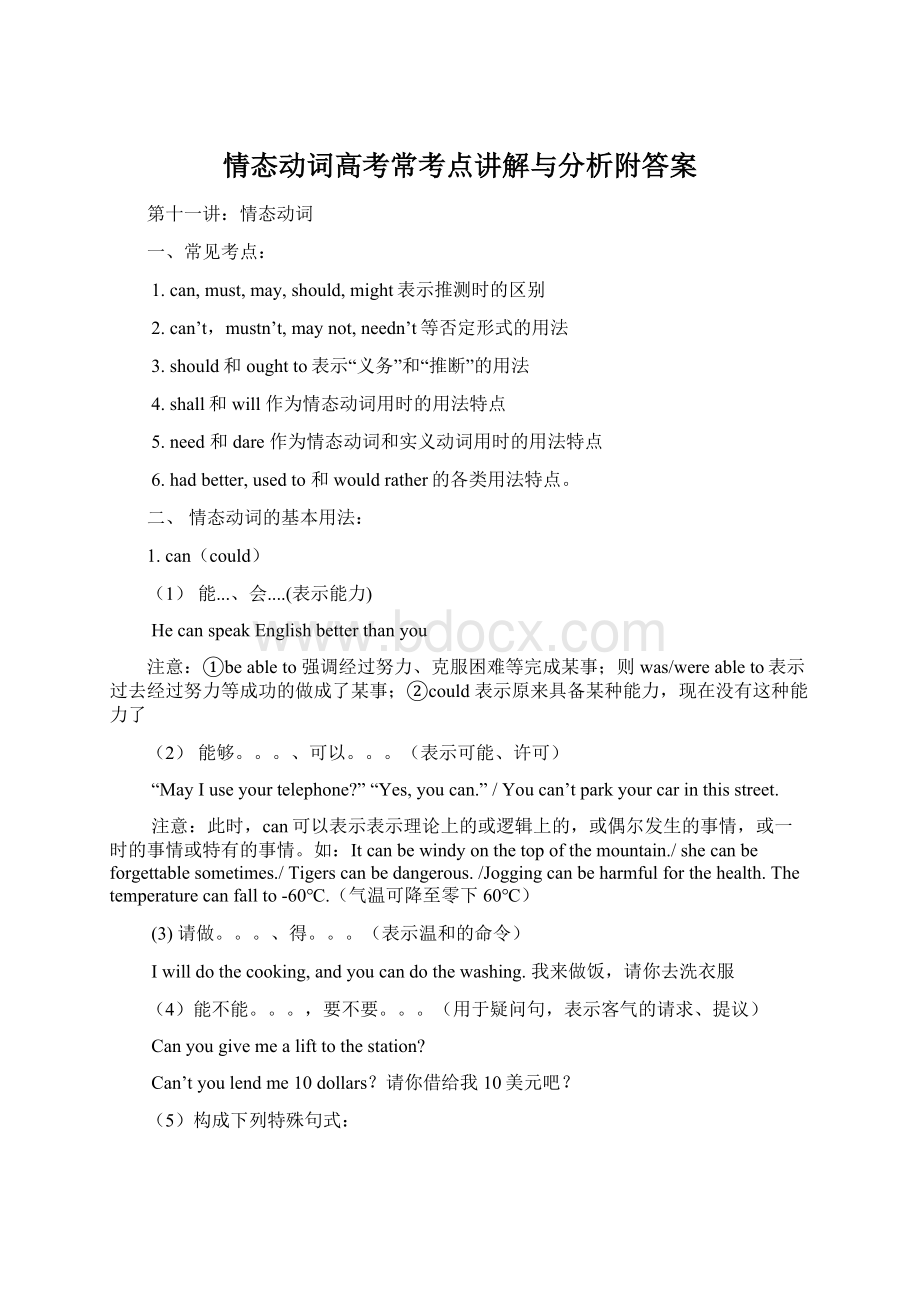情态动词高考常考点讲解与分析附答案.docx
《情态动词高考常考点讲解与分析附答案.docx》由会员分享,可在线阅读,更多相关《情态动词高考常考点讲解与分析附答案.docx(19页珍藏版)》请在冰豆网上搜索。

情态动词高考常考点讲解与分析附答案
第十一讲:
情态动词
一、常见考点:
1.can,must,may,should,might表示推测时的区别
2.can’t,mustn’t,maynot,needn’t等否定形式的用法
3.should和oughtto表示“义务”和“推断”的用法
4.shall和will作为情态动词用时的用法特点
5.need和dare作为情态动词和实义动词用时的用法特点
6.hadbetter,usedto和wouldrather的各类用法特点。
二、情态动词的基本用法:
1.can(could)
(1)能...、会....(表示能力)
HecanspeakEnglishbetterthanyou
注意:
①beableto强调经过努力、克服困难等完成某事;则was/wereableto表示过去经过努力等成功的做成了某事;②could表示原来具备某种能力,现在没有这种能力了
(2)能够。
。
。
、可以。
。
。
(表示可能、许可)
“MayIuseyourtelephone?
”“Yes,youcan.”/Youcan’tparkyourcarinthisstreet.
注意:
此时,can可以表示表示理论上的或逻辑上的,或偶尔发生的事情,或一时的事情或特有的事情。
如:
Itcanbewindyonthetopofthemountain./shecanbeforgettablesometimes./Tigerscanbedangerous./Joggingcanbeharmfulforthehealth.Thetemperaturecanfallto-60℃.(气温可降至零下60℃)
(3)请做。
。
。
、得。
。
。
(表示温和的命令)
Iwilldothecooking,andyoucandothewashing.我来做饭,请你去洗衣服
(4)能不能。
。
。
,要不要。
。
。
(用于疑问句,表示客气的请求、提议)
Canyougivemealifttothestation?
Can’tyoulendme10dollars?
请你借给我10美元吧?
(5)构成下列特殊句式:
①cannot/cannever...too...或cannot...enough...“无论怎么。
。
。
也不过份;越。
。
。
越好;非常。
。
。
”
Onecannotbetoocarefull.越认真越好。
②cannothelpdoing.../cannothelpbutdo.../cannotbutdo...”“禁不住;不由得;不得不”
Whenaclosefrienddies,youcannotfeelbutsad.当一个密友死的时候,你会禁不住伤心的.
(6)can还可以用于一般疑问句和否定句表示推测?
someoneisknocking.Whocanitbe?
而在肯定句中表推测要用must和may
2.may/might
(1)可以。
。
。
(表准许、请求)eg:
Youmaygohomenow,Susan.苏珊,你现在可以回家了
(2)但愿;祝。
。
。
(表愿望、祝福;此时,句子要用倒装语序)Mayyousucceed.祝你成功。
(3)为了,为了能够(用于目的状语从句so..that.../such....that....)
Heworkshardsothathemaygetgoodgrade.
(4)即使,无论(用于让步状语从句中)Whateverhemaysay,Idon’tbelievehim.
(5)构成句型mayaswelldosth/mightaswelldosth(不妨去做某事,还是做某事的好)
(6)May的否定回答不用may,
---MayIuseyourbike?
---No,youmustn’t/You’dbetternot./pleasedon’t(肯定:
Yes,please./Certainly)
3.must
(1)必须、得、要(表义务、必要性、命令)Animalsmusteattolive.(为了活下去,动物必须吃东西。
)
---MustIwashingthesidhesatonce?
---No,youneedn’t../yes,youmust
注:
mustn’t表示“禁止、不准”。
Eg:
Youmustn’tplaywiththeknife;youmighthurtyourself.
(2)必定(表必然性)。
Everyonemustdie.每个人都必定会死。
(3)偏偏、偏要、硬要(表固执、不满等):
Ifyoumustknow,I’mgoingtohelphimlookforanapartment.如果你偏要知道,那我告诉你,我要去帮他找一套公寓。
(4)想必、一定、准是(表推测,只用于肯定句)。
Hemustbeill.Helookssopale.
(5)must的否定回答用:
No,youneedn’t/No,youdon’thaveto
4.shall
(1)用于第一、第三人称,表示征求对方意见,请求指示等:
Shallwegooutforawalk?
注:
may征求对方的许可,而shall是征求对方意见
MayIhavealook?
我能看一下嘛?
?
ShallIhavealook?
要我看一下嘛?
?
(2)用与第二、第三人称,表示说话人的命令、警告、强制、允诺、威胁或决心等:
eg:
Heshallbesorryoneday,Itellyou.我告诉你,他早晚有一天会后悔的(警告)
Don’tworry.Youshallgettheanswerthisveryafternoon.(允诺)。
Nothingshallstopusfromcarryingouttheplan.(决心)
(3)应。
。
。
/须。
。
/得。
。
(用于法律、规则等条文中):
Thefineshallbegivenincash.罚款应以现金
5.should
(1)应该(表义务、责任):
Weshouldattendthemeeting.我们应该参见这次会议。
(2)应该会、想必会、一定会(表预期):
Theconcertshouldbegreatfun.音乐会一定很有意思。
(3)竟然、居然(表惊讶、遗憾):
I’mgladthatyourstoryshouldhavewonthefirstprize.
我很高兴,你的小说居然赢得头奖。
(4)一旦、万一(用于条件状语从句中):
Ifsheshouldknowthetruth,shewouldbegreatlydepressed.万一她知道了实情,她将会非常失望
(5)用于一些表示命令、建议、请求等动词后面的that从句中,如:
suggest,demand,recommend,advise,且,should可以在这个that从句中省略。
Theydemandedthatshe(should)leaveatonce.
(6)究竟是、到底是(与疑问词连用,表示意外、纳闷、惊讶等)
WhoshouldcomeinbutmyoldfriendBetty!
我当是谁进来了呢,原来是我的老朋友贝蒂啊。
(7)用于与将来事实相反的if条件状语从句中,此时省略if,还可以引起倒装
IfIshoudbefreetomorrow,Iwouldgowthyou.=ShouldIbefreetomorrow,Iwouldgowithyou.
6.will
(1)表意愿,用于各种人称陈述句:
Ifyouwillreadthebook,I’lllendittoyou.如果你愿意读这本书。
。
。
(2)表请求,用于疑问句:
Willyouclosethedoor?
Itisabitcold.
(3)表示某种倾向或习惯性动作:
Thedoorwon’topen.(这门打不开)Fishwilldieoutofwater.
(4)表命令、叮嘱:
Noonewillleavetheexaminationroombefore12o’clock.12点前谁也不得离开考场。
(5)表猜测:
Thatwillbethepostmanatthedoor.门口想必是邮差。
7.would
(1)常常、经常(表过去的习惯性动作):
Wewouldstayupallnighttalkingourfuture.
区别:
usedto____________________________________________________________
(2)老是、偏要(表示说话者的厌烦、焦躁):
That’sexactlylikeSusie.ShewouldcometomejustwhenIwasbusy.苏西就是那个样子,她老是在我忙碌的时候来找我。
(3)就是(不能)(用于否定句,主语一般是物,表某物一时的、暂时的特性)Thatdoorwouldn’topen.
(4)表示客气的请求、建议;或婉转的表达个人的想法、看法:
WouldyoumindifIopenthewindow?
8.oughtto
(1)表义务、应该,口气比should稍重。
Youarehisfather.Yououghttotakecareofhim.
(2)表推测,暗含很大的可能:
HanMeioughttokonwhistelephonenumber.
9.usedto
表示过去的习惯性动作或状态,现在不发生或存在。
疑问式和否定式有两种:
如Iusedn’ttosmoke.=Ididn’tusetosmoke.
10.haveto(wouldrather+do)
haveto和must的意义相近,只是must侧重表示说话人的主观看法,而haveto则表示客观需要,如:
Imuststudyhard.Ihadtogiveitupbecauseofillness.
11.need和dare
这两个词都即可用作情态动词,也可用作实义动词。
1用作情态动词,主要用于否定句和疑问句;用作实义动词,主要用于肯定句(当然也可以用于否定句等)
2用作实义动词:
Youneedn’tdoityourself.=Youdon’tneedtodoityourself.
Ineedtotellthemthenews.
③need的主语是物时,其后的动词可以是:
doing或tobedone.
Thetableneedspainting.=Thetableneedstobepainted.
④dare在否定句中,用作实义动词时,其后的to可带,也可以不带。
Hedidnotdare(to)lookup.他不敢抬头看。
⑤Idaresay....为固定习语,意思是“我敢说。
。
。
。
”
三、情态动词+havedone的用法:
情态动词+havedone一定表述的是过去的事情,且表示对过去发生的事情的推测、判断,或表某种强烈的语气(如惊讶、责备、赞叹等)
⑴must+havedone表“过去肯定发生了某事”。
Theroomisclean.Someonemusthavecleanedit.
注:
绝对没有下面的形式:
mustn’thavedone.
⑵may/might+havedone表示“过去可能发生了某事”,其中might的语气要婉转些;但是主句中动词是过去时,一定要用might,如Hesaidshemighthavemissedthetrain.
⑶could+havedone,表示“过去本来能够做成某事,但是没有做到”:
Youcouldhavesucceeded.
⑷can’t/couldn’thavedone表示“绝不可能发生了某事”:
Hecouldn’thavetakenallthemedicineatatime.
⑸should/oughtto+havedone,表示“过去本来应该做某事,但实际上未做”
Youarelateagain.Yououghttohavecomeonehourearlier.
⑹shouldn’t+havedone/或oughtn’ttohavedone,表示“过去不应该做某事而做了某事”
Thisismyletter.Youshouldn’thaveopenedit.
⑺needn’t+havedone表示“本没有必要做某事,而做了”
Therewasplentyoftime,sosheneedn’thavehurried.有充足的时间,所以她没有必要哪么急的。
。
注:
如果是对现在或将来的情况进行推测或判断,要用:
“情态动词+V-原”。
四、must表示推测时:
其反义疑问句的构成如下:
Hemustbeateacher,______________?
Shemusthavefinishedthework,_____________?
Shemusthavefinishedtheworklastnight,______________?
Shemusthavefinishedtheworkbytheendoflastmonth,___________?
五:
同步巩固训练:
基础训练:
1.-shallItellJohnaboutit?
-No,you___________.
A.needn'tB.wouldn'tC.mustn'tD.shouldn't
2.Peter_____comewithustonight.Butheisn'tverysureyet.
A.mustB.canC..mayD.will
3.Ididn'tseeherinthemeetingroomthismorning.She______atthemeeting.
A.mustn'thavespokenB.Shouldn'thavespoken
C.needn'thavespokenD.can'thavespoken
4.Ididn'thearthetelephone.I_____asleep.
A.mustbeB.musthavebeenC.shouldbeD.shouldhavebeen
5.-______Iopenthedoorforyou?
-No,thanks.Icanmanagebymyself.
A.WillB.MayC.ShallD.Should
6.Oneought_______forwhatonehasn'tdone.
A.nottobepunishedB.tonotbepunished
C.benottopunishedD.notbepunished
7.Thefirespreadthroughthehotelveryquicklybuteveryone______escape.
A.hadtoB.wouldC.couldD.wasableto
8.ItoldSallyhowtogethere,butperhapsI_______forher.
A.hadtowriteitoutB.musthavewrittenitout
C.shouldhavewrittenitoutD.oughttowriteitout
9.Acomputer_____thinkforiself;itmustbetoldwhattodo.
A.can'tB.couldn'tC.maynotS.mightnot
10.TellTomthathe____havethebooknextweek.
A.shallB.willC.canD.would
11.Ifyoureallywantyourselftobeingoodhealth.youmust____always_____somuch.
A.not;besmokingB.not;havesmokedC.tonot;besmokingD.notbe;smoked
12.Withsomuchworkonhand,you____toseethegamelastnight.
A.mustn'tgoB.shouldn'tgoC.couldn'thavegoneD.shouldn'thavegone
13.Someoneisknockingatthedoor.Who__itbe?
A.mayB.mustC.willD.can
14.-Look,it____beTom.
-No,it_____behim.HehasgonetoBeijing.
A.may,mustn'tB.must,mayC.must,can'tD.can,maynot
15.Don'tbeworried.Thenews___beture.
A.maynotB.mustn'tC.needn'tD.won't
16."It'spossiblethatMr.wuisworkingnow."
Thesentencemeans______.
A.Mr.WumustbeworkingnowB.Mr.Wucan'tbeworkingnow
C.Mr.WushouldworknowD.Mr.Wumaybeworkingnow
17.Youmothermustbeathome,_____she?
A.mustn'tB.doesn'tC.isn'tD.can't
18.-_____IwatchTVthisevening?
-Yes,butyou______finishyourhomeworkfirst.
A.Must;canB.May;mustC.Must;maynotD.Must,can't
19.-____Isleephere?
-No,you___.
A.May;needn'tB.May;mustn'tC.Can;needD.May;may
20.-MustIturnoffthelightnow?
-No.you____.
A.needn'tB.mustn'tC.can'tD.won't
21.You___soearly.
A.needcomeB.doesn'tneedcomeC.needscomeD.needn'tcome
22.We____them.Theycandoitbythemselves.
A.needhelpB.don'tneedhelpC.don'tneedtohelpD.needn'ttohelp
23.You'dbetter___inclass.
A.nottalkB.nottotalkC.don'ttalkD.nottalking
24.You____gowithusnow,oryouwillbelate.
A.shallB.shouldC.wouldD.could
25.-NeedIgotoworknow?
-Yes,you____.
A.needB.canC.mayD.must
26.Couldyoutellmeifthere____plentyofraininyourhometown?
A.isB.wouldbeC.areD.was
27.Aboywascrossingthestreetinfrontofmycar,andI_____stopveryquickly.
A.mustB.havetoC.hastoD.hadto
28.Xiaowang____havebeentoJapan.Hehasnevertoldthis.
A.willnotB.cannotC.shallnotD.maynot
29.She_____havehadahardlifesinceshelookedmucholderthanherage.
A.mayB.maynotC.mustn'tD.must
30.Hewenthomebecausehismotherwasill.We____havewaitedforhimatthebusstationforalongtime.
A.needn'tB.needC.mustD.shall
31.Youarelateforclass.You____havecometoschoolearlier.
A.shallB.mustC.willD.should
32.MrWangiswetthrough.He___caughtintherain.
A.mustbeB.musthavebeenC.musthasbeenD.mustnave
(答案详解见最后面)
2007年真题:
1.—How’syourtouraroundtheNorthLake?
Isitbeautif